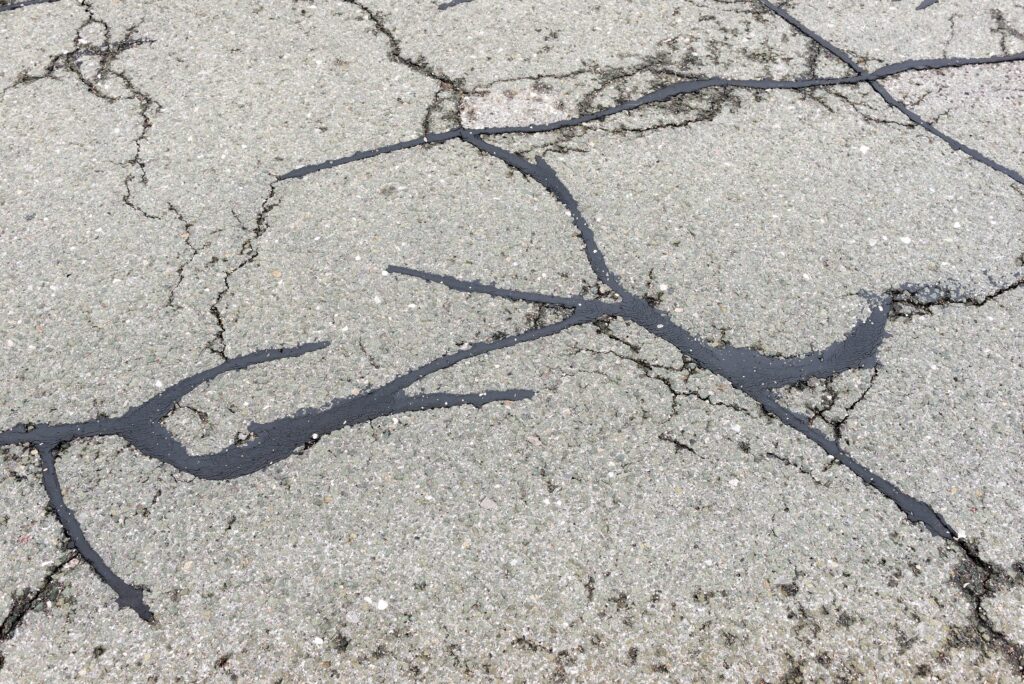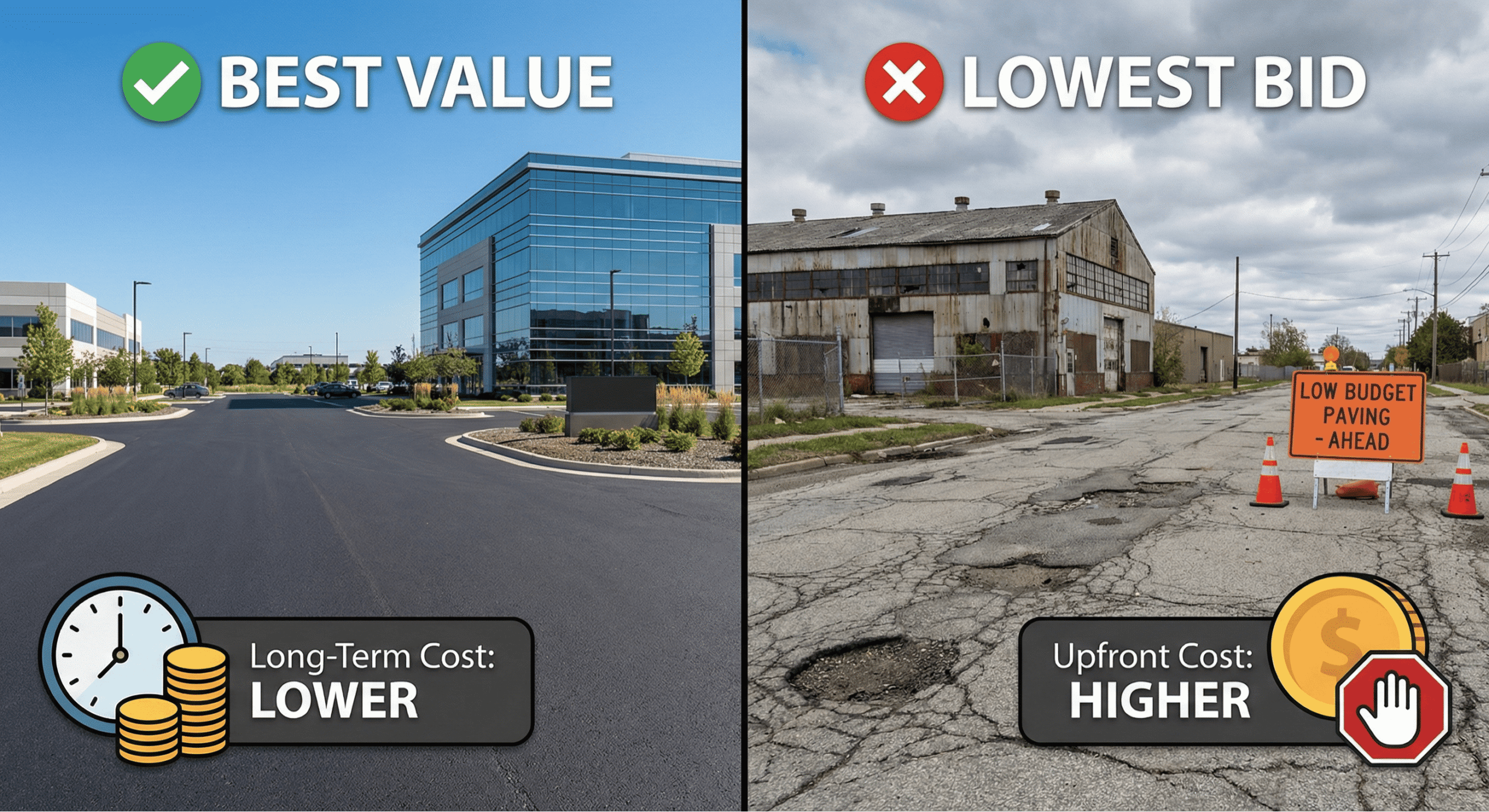
Small cracks in your asphalt driveway or parking lot might seem harmless at first.
But over time, these tiny openings allow water to seep in, leading to bigger issues like potholes, crumbling edges, and costly repairs
Crack sealing is a straightforward and effective way to prevent these problems. By sealing cracks early, you protect your pavement from water damage and extend its lifespan.
In this blog, we’ll explore why crack sealing is essential for maintaining durable and safe asphalt surfaces. You’ll also learn when to seal cracks and why acting early can save you from expensive repairs later.
What is Crack Sealing and What Does It Mean for Asphalt Maintenance
Crack sealing is a preventive maintenance technique used to protect asphalt surfaces from water damage and further deterioration. It involves cleaning existing cracks and filling them with a specialized sealant that expands and contracts with temperature changes.
This process helps keep water, debris, and other harmful elements out of the cracks and prevents larger issues like potholes or structural damage.
As minor cracks are dealt with early, crack sealing extends the lifespan of your asphalt pavement and reduces the need for costly repairs down the road.
Different Types of Asphalt Cracks
Cracks in asphalt can appear in various forms, and understanding them better helps you choose the right treatment.
Common types are:
- Fatigue Cracking (Alligator Cracking): Often caused by heavy traffic, this pattern looks like alligator skin and spreads over time.
- Block Cracking: These large, rectangular cracks are typically caused by temperature changes and eventually cause the asphalt to shrink.
- Edge Cracking: As evident from the name, these are found along the edges. Common reasons include poor drainage or lack of support.
- Longitudinal Cracking: Caused usually by construction issues or base movement, these are cracks that run parallel to the centerline.
- Transverse Cracking: Such cracks are often caused by thermal stress and appear perpendicular to the centreline.
Why Crack Sealing is The Best Defense Against Asphalt Damage
Now, let’s break down why sealing cracks early makes such a big difference to the longevity of your asphalt.
Blocks Moisture from Getting In
Crack sealing is the first line of defense in asphalt maintenance. A hot or cold rubberized sealant is applied into the cracks. This flexible material moves with the pavement and blocks out moisture, dirt, and weeds.
It Prevents Water Infiltration
Water is one of the primary culprits behind asphalt deterioration. When cracks form in the pavement, water can seep into the underlying layers. This leads to erosion, weakens the base, and makes way for pothole formation.
Crack sealing thoroughly blocks water from entering these cracks and safeguards the structural integrity of the asphalt and prevents further damage.
Prevents Potholes from Forming
Water is a big enemy to asphalt. When it gets below the surface, it weakens the base and causes the pavement to collapse over time. Sealing cracks early prevents potholes from forming later.
Protects Against Oxidation
Asphalt is made from aggregates and a binder called bitumen. Over time, exposure to oxygen and UV rays breaks down the bitumen and causes it to become brittle. This process is called oxidation, and it makes the asphalt more likely to crack.
Once cracks form, oxidation speeds up even more because the exposed edges are directly affected. Crack sealing helps slow this down by protecting the edges of the cracks and limiting exposure to air and sunlight.
Reduces Stress from Traffic Loads
When a vehicle rolls over that weak spot, especially a heavy one, it applies pressure that can cause the crack to spread or deepen. With crack sealing, you strengthen these weak areas with more support, so they can hold up better under daily traffic.
Helps You Avoid Larger, Costlier Repairs
Crack sealing is a relatively low-cost way to prevent very high-cost repairs later. Without it, you’re looking at more than just patchwork. You could end up needing to mill and resurface entire sections of pavement, or even replace it altogether.
This can cost thousands of dollars, especially for commercial properties or large driveways. Crack sealing will always keep those hefty repairs away as long as possible.
Other than playing a key role in preventing major damage to asphalt surfaces, crack sealing also has a number of other benefits, such as:
- Minimizes weed growth through pavement cracks
- Prevents sand, gravel, and debris from settling into open cracks
- Enhances the performance of future sealcoating and overlays
- Helps maintain a smooth surface for pedestrians and vehicles
- Adds to the resale or leasing value of commercial properties.
- Improves visibility of parking lot lines and markings by preserving the surface
- Deters ants and insects from nesting in pavement gaps
- Helps detect and monitor new cracks over time
- Delays the need for full asphalt resurfacing, which can be 10x more expensive
- Supports better drainage by preventing uneven surfaces caused by crack expansion
When and How Often to Seal Cracks
The best time to seal asphalt cracks is during dry weather in spring or early fall when temperatures are moderate. These conditions help the sealant bond properly with the surface.
As for how often, it’s a good idea to inspect your pavement once a year and reseal cracks every 2-3 years or sooner if new cracks appear. Regular sealing keeps moisture out and helps extend the life of your asphalt without the need for costly repairs.
DIY vs. Professional Crack Sealing: What’s Right for You?
You have two options for crack sealing: doing it yourself or hiring a professional. Both have advantages, but professional crack sealing is often the best choice for lasting results.
Here is a comparison table to help you decide between the:
| Aspect | DIY Crack Sealing | Professional Crack Sealing |
| Cost | Lower upfront cost | Higher upfront cost, but more durable |
| Time & Effort | Requires more time and effort | Faster and hassle-free |
| Effectiveness | Can work for small cracks, but may not last | Provides a more thorough, long-lasting seal |
| Expertise | Limited experience can lead to improper application | Professionals have the right tools and expertise |
| Safety | Potential safety risks | Safe and efficient process |
While DIY crack sealing might be suitable for small cracks, hiring a professional is often the best way to ensure long-term durability, especially for larger areas or cracks that require precise attention.
Frequently Asked Questions
Should I seal cracks in my asphalt driveway?
Yes. If you see cracks forming, sealing them right away prevents water from getting under the surface and starting the pothole process. After cracks are cleaned and filled, applying a sealcoat adds another layer of protection against UV rays and moisture
How long does asphalt crack sealing last?
A quality hot‑pour rubberized seal can stay flexible and effective for up to eight years, even under heavy traffic. Manufacturers and paving pros often guarantee crack seals for five to eight years before re‑inspection is needed.
How long should an asphalt driveway last before cracking?
A well‑installed and maintained asphalt driveway generally lasts 15–50 years before significant cracking appears. In many regions, average lifespans fall between 15 and 20 years, depending on climate, load, and maintenance.
What is the best sealant for driveway cracks?
Hot‑applied rubberized asphalt sealants are top‑rated for flexibility and adhesion on moving cracks (as featured in the Washington Post). For DIY fixes, self‑leveling polyurethane options like Sika Sikaflex‑410 earn high marks for durability, weather resistance, and ease of use. (as ranked by the US Sun)
Is crack filling better than crack sealing?
Crack sealing uses flexible rubberized material that bonds deep in active cracks, making it the only permanent fix for gaps that expand and contract. Crack filling uses stiffer, non‑rubberized patching compounds suited for non‑moving cracks under 0.1″ wide, but it won’t flex with the pavement.
Crack Seal Your Asphalt Before It’s Too Late
Small cracks might not seem like a big deal now, but left untreated, they can cause serious damage down the road. As these cracks grow, they let in water, which can break down the pavement and lead to expensive repairs.
The longer you wait, the more costly and disruptive the damage becomes! Don’t risk the safety and appearance of your asphalt.
With Asphalt Coatings Company’s professional crack sealing services, you can prevent water damage and avoid costly repairs. Our team helps keep your pavement looking great and lasting for years. Our experienced team is ready to help you maintain a smooth, safe surface.
Don’t wait! Contact us today to schedule a consultation and protect your pavement investment.



